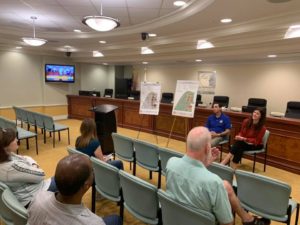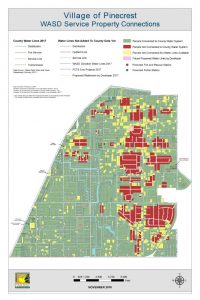Pinecrest voters rejected a plan Tuesday that would seek $15 million in bonds to pay for approximately 18.5 miles (98,000 linear feet) of pipeline infrastructure so 739 properties can connect to Miami-Dade County water.
The vote came down to 63% against and 37% for taxing themselves an additional 23 cents per $1,000 of taxable value, or an average of $158 a year —  of course, some homes would pay much, much more — for the next 20 years so that every property in the village would have access to county water.
of course, some homes would pay much, much more — for the next 20 years so that every property in the village would have access to county water.
Not even the promise of an additional 208 fire hydrants — which are not necessary to cover water needs according to the fire rescue guys but good for drumming up fear votes — could sway villagers who made the decision via a mail-in ballot only.
According to Miami-Dade County’s elections department, 5,720 of the 13,083 registered voters in Pinecrest returned ballots. That amounts to practically a  44% turnout.
44% turnout.
The village undertook an aggressive “get out the vote campaign” that included eight — count ’em, eight; two per week, including the last one this past Saturday — public workshops for residents and property owners to learn about the project and see the map. They were not very well attended.
The village slapped posters in public spaces and sent postcards to all registered voters and a letter from the administration explaining what the financial impact would be.
They got one of those FDOT-like signs with the blinking lights to remind folks to vote — and they hired a guy with a spinning sign on U.S. 1.
Read related: Pinecrest voters to decide if they’ll pay extra taxes to get county water
The two recurring themes among some of the 3,593 who voted against it were (1) a reluctance to subsidize the water hookup for homes of multimillionaires and (2) the concept that it should be a responsibility of Miami-Dade County, which would retain the infrastructure and derive all the profits from the water sales. Those were exactly the reasons that Councilman James McDonald voted against putting the referendum on the ballot and campaigned against it.

Miami-Dade County policy dictates that the cost associated with new water infrastructure be borne by private developers/private property owners. Revenue from the sale of water to existing customers can only be used to fund expenditures and improvements to the existing infrastructure, not new infrastructure — not unless, of course, they can cover it with “economic development” like the megamall in Northwest Dade.
But the county has paid for some of the hookups.
When Pinecrest first incorporated in 1996, about 1,500 homes were on wells, without any way to hook up to the county water supply. The 2004 countywide Building Better Communities bond referendum supplied the village with $4.3 million and a Florida state grant gave another $1.5 million for the water pipeline infrastructure up to the sidewalk. That work was called Phase I and Phase II and was completed about 10 years ago, said City Manager Yocelyn Galiano. Property owners still had to pay for the service hook-up connection from the public right of way to their homes/buildings, she said.
More than 2,100 people voted in favor, including, we suppose, advocates like  former mayors Evelyn Greer and Cindy Lerner and former Councilwoman Cheri Ball, right, who basically stepped down to push for the measure and served as treasurer of the Pinecrest H2O political action committee.
former mayors Evelyn Greer and Cindy Lerner and former Councilwoman Cheri Ball, right, who basically stepped down to push for the measure and served as treasurer of the Pinecrest H2O political action committee.
Ball and her husband also happen to own a two-story, 6 bedroom, 4 bath house they bought in 2016 for $1.6 million — that doesn’t have access to county water.
Some might think this is over, that the referendum was a way of putting this long fought issue to rest. But Ladra knows it’s never that easy. Ball and the other proponents are unlikely to give up. And while it’s not a big county issue — only 2,000 people lack water access countywide compared to hundreds of thousands on septic tanks (more on that later) — there may be other places to turn to for funding.
“We’ll just keep looking for the funding from the state legislature, which we’be been doing but we keep getting vetoed,” Galiano said. “Maybe with this new governor…”

